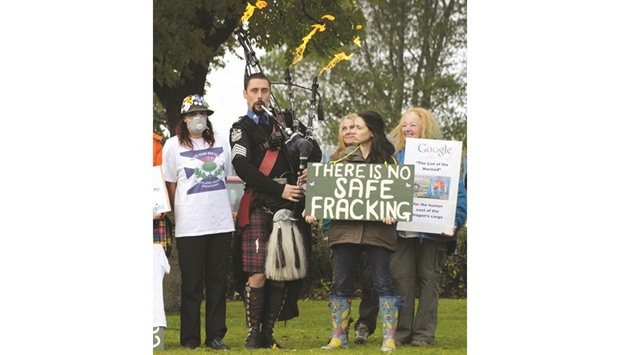The huge “Ineos Insight” tanker had entered the Firth of Forth at sunrise, a lone Scots piper playing on its bow, as it headed for the Grangemouth refinery, west of Edinburgh. But gusty squalls prevented it from unloading its controversial cargo before an assembled crowd of dignitaries.
“The Insight vessel was unable to dock at the port due to high winds,” said a spokesman for Zurich-based chemicals giant Ineos.
It would arrive at the port as soon as wind died down, he added.
Ship tracking data on Reuters showed the vessel had turned back into deeper waters.
Ineos is importing ethane, obtained from rocks fractured at high pressure, or “fracking”, in a foretaste of larger deliveries of liquefied natural gas (LNG) from shale set to reach Europe in 2018.
Environmentalists say the technique causes problems including pollution of the water table, and attempts to set up fracking operations in England have run into stiff opposition.
“Setting aside the devastating local impacts of fracking, the climate consequences of extracting yet more fossil fuels are utterly disastrous,” said Friends of the Earth Scotland’s head of campaigns, Mary Church.
Scotland’s devolved government imposed a moratorium on fracking last year and the Labour party said this week it would ban it if the party were elected in 2020.
But the industry has the full backing of Conservative Prime Minister Theresa May.
Ineos chairman Jim Ratcliffe argues that as the North Sea is unable to keep supplying the base ingredients to make chemicals at Grangemouth, shale gas will be an important future energy resource.
“There simply is insufficient raw material (oil and gas) coming out of the North Sea to run Grangemouth so we’re talking about 10,000 jobs in total that depend on that facility,” Ratcliffe told BBC Radio Scotland.
“So were it not for the shale gas that we’re bringing in from the US, Grangemouth would have closed three years ago.”
Ineos is Britain’s biggest shale gas company in terms of acreage and it has promised to share 6% of future shale gas revenue with local communities.
It has built an import terminal at Grangemouth as part of a project costing £450mn.
The ethane will be converted into ethylene, used in the production of a range of plastic products, solvents and antifreezes.
Ineos says it wants to create a new manufacturing hub around Grangemouth to allow other producers access to US ethane, which it says is cheaper.
“We can and should be allowed to develop our own shale, creating even more value for our economy and environment,” said Ken Cronin, chief executive of industry group UK Onshore Oil and Gas.

